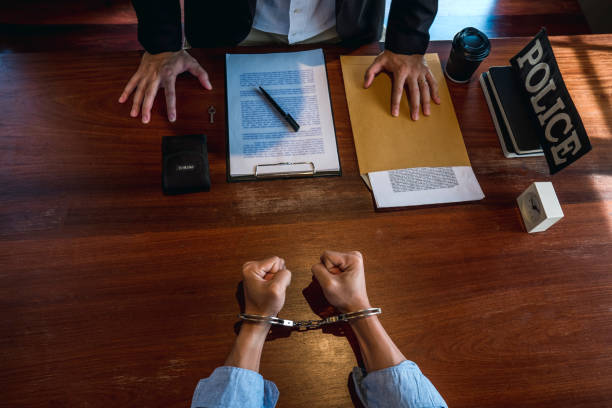Who is a police prosecutor and what roles does one have in the legal system? Are they the same as a police officer? Generally, prosecutors act as the legal representatives of the government, typically the state or federal government depending on the crime. They are responsible for upholding the law and ensuring justice is served.
Moreover, prosecutors are essential to maintaining the efficiency and fairness of the criminal justice system. They serve as a vital link in the criminal justice system, representing the state’s interest in maintaining the rule of law.
Unlike some jurisdictions where prosecutors must be qualified lawyers, NSW police prosecutors are sworn police officers who undergo specialised training in legal advocacy. This means they don’t necessarily hold a law degree.
In this article, we will talk about Police prosecutors in New South Wales, Australia (NSW), what they do, where they work, and how they are different from barristers and solicitors.
Who Is a Police Prosecutor NSW?
Police prosecutors are a unique element in some legal systems, particularly in NSW. They differ from the standard image of a prosecutor in the following manner:
- Unlike traditional prosecutors who are lawyers, NSW police prosecutors are sworn police officers who have received specialised training in legal advocacy. This means they may not necessarily hold a law degree but have been equipped with the necessary legal knowledge to handle local or supreme court proceedings.
- A police prosecutor’s primary responsibility lies with the Local Court of NSW. Local courts deal with less serious criminal offences and some civil matters, as opposed to higher courts that handle major crimes (magistrates courts or supreme courts)
- Police prosecutors remain part of the NSW Police Force structure. While they don’t wear uniforms in court, they still hold a position within the police hierarchy.
- A police prosecutor acts as a bridge between the investigating police officers and the legal system. They take the evidence gathered during the investigation and present it effectively in court, ensuring a smooth transition from investigation to prosecution.
What Do Police Prosecutors Do?
With a success rate of 90% or higher, police prosecutors successfully prosecute around 95% of criminal matters in court of summary jurisdiction on behalf of the NSW Police Force and numerous other government agencies.
In addition to offering advocacy services for victims of family and domestic abuse, they also offer operational legal assistance to all NSW Police Force levels around the clock. Here are the various units that are under the Police Prosecutor Command:
- Coroner’s Court. Maintaining a distinguished custom, police prosecutors support the State Coroner during inquest proceedings. They provide strategic legal advice to support significant policing operations and serious crime investigations.
- Operational Legal Advice Unit. Police Prosecutions Command is in charge of giving the field specialised support by promptly advising on a range of legal matters and doing research aimed at resolving gaps and contradictions in the law.
- Covert Applications Unit. They also assist in the creation of affidavits to support applications and offer guidance on applications for surveillance equipment and telecom interception warrants. Moreover, a police prosecutor can give guidance on matters legal and other that come up when listening devices and telecom intercepts are used.
- Executive Legal Support Unit. Police prosecutors also provide company counsel on legal matters. Moreover, a police prosecutor provides legal advice to commands on corporate policies, procedures, and SOPs as well as assistance to the NSW Police Force Executive on cabinet minutes, bills, and external correspondence.
- Prosecution Support Unit. The instruction, professional growth, and training that trainee police prosecutors require to carry out their duties as police prosecutors are provided by this unit.
They also oversee unique legal projects undertaken by Police Prosecutions that are relevant to legal education throughout the Service, IT legal upgrades, and enhanced legal procedures.
What’s the Prosecution Process?
Police and police prosecutors must adhere to the guidelines outlined in the Director of Public Prosecutions’ Prosecution Policy when determining whether to prosecute an individual for a crime. Generally speaking, a suspicion, an allegation, or a confession may spark the prosecution process.
However, not all criminal cases will lead to prosecution because the foremost criterion is the interest of the general public. A police prosecutor determines whether to prosecute a matter to serve the public interest in three steps:
- Sufficient evidence – A police prosecutor will assess whether or not the admissible evidence at hand is sufficient to establish each element of the offense.
- Possibility of guilt – They will also assess whether or not it is possible to conclude that a reasonable jury (or other tribunal of fact) with the necessary legal instruction would not find the matter guilty.
This calls for the use of judgment, which will be based in part on how strong the prosecution’s case is and how much evidence is available in relation to the expected proceedings and the environment in which they will take place. This is a test suitable for both summary and indictable offences.
- Public interest – Whether or not the matter should proceed in the public interest notwithstanding discretionary reasons dictating otherwise.
Police Prosecutors vs. Barristers and Solicitors
Although assuming almost the same role in the NSW justice system, there are several differences between police prosecutors and barristers/solicitors:
- As to qualifications, police prosecutors don’t necessarily require a law degree. They are trained police officers who undergo specialised legal training. On the other hand, barristers and solicitors must hold a law degree and complete further professional training
- As to role, police prosecutors primarily handle summary offenses and less serious indictable matters in the Local Court. They represent the NSW Police Force, presenting evidence and arguing the case for the prosecution. For barristers, they advocate and represent clients in court, often instructed by solicitors. For solicitors, provide legal advice, draft legal documents, and represent clients in some court matters (often lower courts).
- The NSW Police Force employs police prosecutors, whereas barristers work independently and receive briefs from solicitors or clients directly, and solicitors either operate in private practice or work for legal firms.

Consult a Legal Expert
You may find it intimidating to handle a complicated legal matter, especially if a supreme or magistrates court hears your case. Your strongest ally is our criminal defence lawyers from JB Solicitors who will defend your rights and determine the best course of action for your circumstances.
Make an appointment for a consultation right now to go over your case and receive the legal advice you need.
